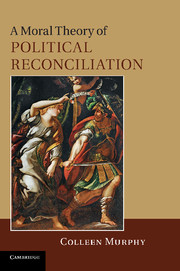6 - International criminal trials
Published online by Cambridge University Press: 02 December 2010
Summary
INTRODUCTION
This chapter focuses on the role of the international community, and of international criminal trials specifically, in the promotion of political reconciliation within transitional societies. An inquiry into the role of international criminal trials in promoting political reconciliation may seem unpromising for two reasons. For one thing, the operations of some hybrid and international criminal tribunals are hampered by insufficient financial resources, a lack of international personnel familiar with local cultures and languages, hostility to international personnel in certain transitional contexts, and rejection of the legitimacy of such tribunals. Such limitations call into question the ability of international trials to prosecute and successfully convict perpetrators and counter impunity. For those who see impunity as an obstacle to reconciliation, the limitations with international criminal tribunals strengthen skepticism about the ability of such trials to promote reconciliation.
One objective of this chapter is to temper such skepticism. My thesis is that international criminal trials can contribute to political reconciliation by fostering the social conditions necessary for law's efficacy. This chapter builds on Chapter 1, in which I argue that the cultivation of mutual respect for the rule of law is a constitutive part of the process of political reconciliation. The (re-)establishment of mutual respect for the rule of law is an important part of the process of repair because relationships structured by law realize three important moral values: agency, reciprocity, and justice.
- Type
- Chapter
- Information
- A Moral Theory of Political Reconciliation , pp. 167 - 186Publisher: Cambridge University PressPrint publication year: 2010

